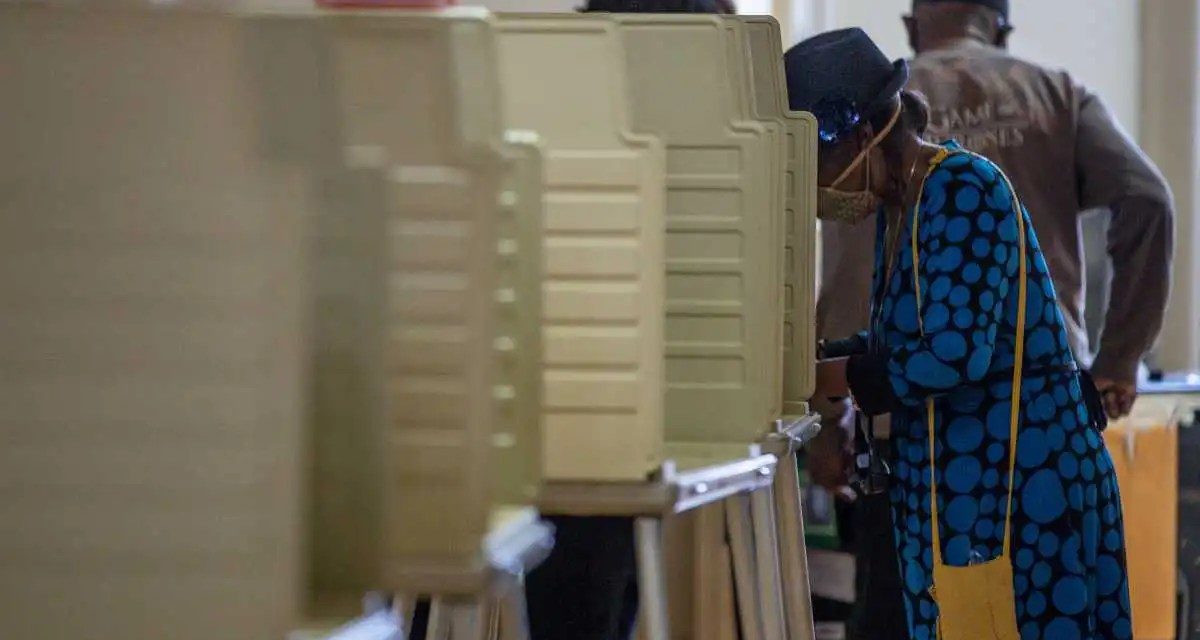A voter fills out her ballot at Central United Methodist Church in downtown Detroit during the primary election on Aug. 4, 2020. (Photo by Junfu Han/Detroit Free Press)
By Olivia Lewis, Bridge Detroit
On National Poll Worker Day, Michigan legislators began discussing ways to enforce more rigid — and costly — rules for municipalities and those who ensure elections are fair.
The House Elections and Ethics Committee has spent the past month discussing limited timelines for valid signatures on state identification to vote, tightened absentee voter drop box rules, and more stringent guidelines for poll challengers.
Related:
- Michigan GOP officials, activists push for 2020 election audit
- Without extra election funding, how will Detroit manage in 2021?
- Why Detroiters should worry about the Senate elections package
Michigan House Republicans introduced a swath of election-related bills last summer that they say will ensure the accuracy of elections, even though all evidence has shown that the state’s vote count process is already fair, accurate and secure. Democrats have widely criticized the extensive package and called it a costly and unnecessary burden that will deter Michiganders from participating in future elections. Gov. Gretchen Whitmer vetoed the package last fall, but with enough voter signatures and support from the Board of State Canvassers, state lawmakers have the power to override her decision.
Republicans contend that invalid absentee ballots were used in the November 2020 election after the secretary of state allowed Michiganders to vote absentee without reason and to register to vote on Election Day.
“Looking back, we’ve learned a lot from the big election in 2020 with same-day registration, a lot of people applying with no reason absentee,” Ann Bollin, chair of the Elections and Ethics Committee, said during their January meeting.
Detroit was scrutinized during and after the November 2020 presidential election. Trump supporters stormed the TCF Center where votes were being counted, filed lawsuits against the vote count process, and tried to certify all votes except those from Detroit residents.
Molly Sweeney, director of organizing at 482 Forward, was a challenger at the TCF Center the evening of the presidential election on Nov. 3, 2020. She said the building had a “contentious vibe.” Sweeney was present to ensure the challenger system was balanced and that both parties were represented.
“People were absolutely there on purpose to interrupt and critique the process, and the poll workers were the heroes,” she said. “They had a very strong process from the inspectors to the team leaders who were there on the floor. They were making sure that things were going smoothly and setting clear boundaries for folks, but there were a lot of things that the GOP challengers (were doing) that were really intimidating.”
Sweeney said the scene was filled with an “air of scrutiny and suspicion” that led to “hostile disruptions.”
Following their unsuccessful attempts at the local level, Republicans are now arguing for state policy change through legislative decision-making.
The Elections and Ethics Committee has discussed reducing the time that signatures are valid on state identification cards from 12 years to eight. Absentee voters’ signatures are used to verify their identity when casting their vote. Under federal law, absentee voters have to update their signature only every 16 years, but Michigan shortened the length of time in 2020 to 12 years. Now, just two years later, Republicans want to shorten it again, to eight years.
Bollin said that changing the rules and requiring voters to update their information more often will be a “great tool in the toolbox for clerks.”
But local elections experts disagree.
Read the Full Story
Subscribe to One Detroit’s YouTube Channel & Don’t miss One Detroit Mondays and Thursdays at 7:30 p.m. on Detroit Public TV, WTVS-Channel 56.
Catch the daily conversations on our website, Facebook, Twitter @DPTVOneDetroit, and Instagram @One.Detroit
View Past Episodes >
Watch One Detroit every Monday and Thursday at 7:30 p.m. ET on Detroit Public TV on Detroit Public TV, WTVS-Channel 56.





